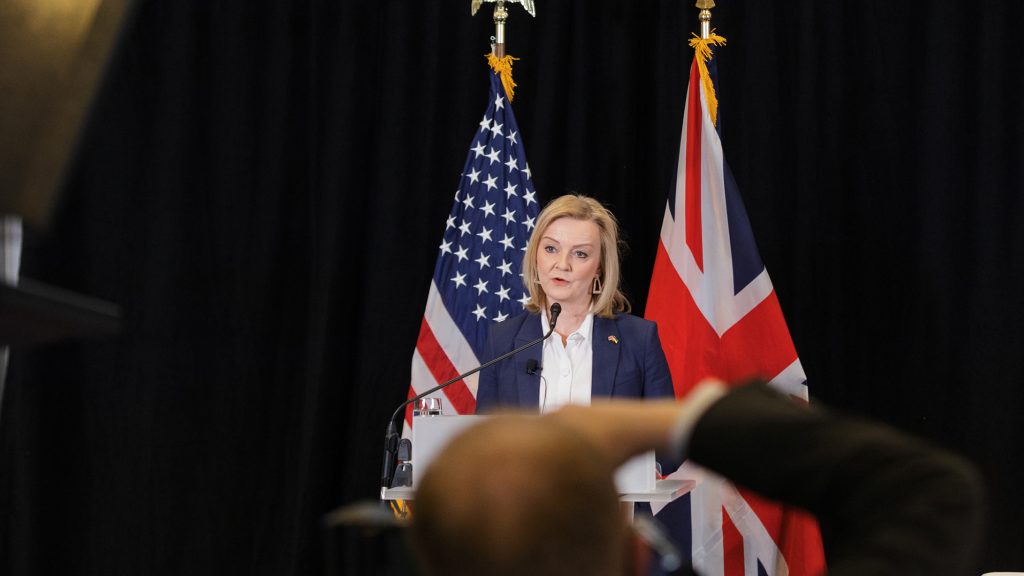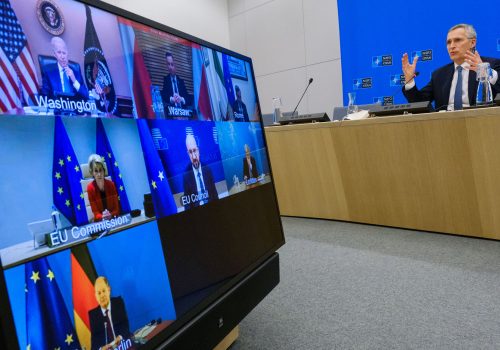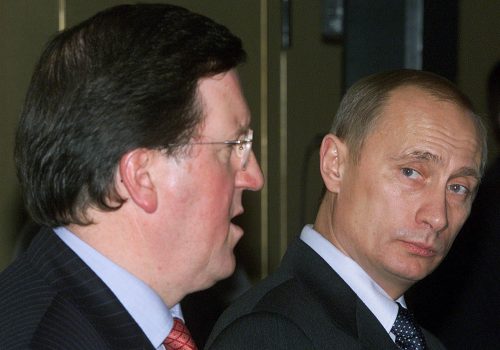On Thursday, UK Foreign Secretary Liz Truss joined the Atlantic Council for the 2022 Christopher J. Makins Lecture to address the global ramifications of Russia’s invasion of Ukraine and the West’s response to Russian President Vladimir Putin’s aggression. Below, edited for length and clarity, are her opening remarks and conversation with Frederick Kempe, president and chief executive officer of the Atlantic Council.
Explore the foreign secretary’s remarks
- Why Russia’s invasion of Ukraine has brought an end to the world’s “era of complacency”
- Why Putin’s assault “is a paradigm shift on the scale of 9/11”
- How to ramp up sanctions pressure on Russia so that “their trade can’t flow, their ships can’t dock, and their planes can’t land”
- Why “Putin must lose”
- Why the sanctions endgame is to “debilitate the Russian economy”
- What to expect from the “next phase” of the West’s information offensive
- Why China should avoid “the company that Russia is in”
- What other countries can learn from Germany “rethinking its energy policy, its security policy within the space of about a week”
The foreign secretary’s lecture
In the late 1990s, I worked for Shell. And one of my first roles was [at a] ship refurbishment project in Norfolk, Virginia, just south of here, and I was overseeing two LNG vessels that had been mothballed due to lack of demand. Back then in the oil industry, we were modeling oil prices at ten dollars a barrel. Today, it is heading towards two hundred dollars a barrel. It feels like a different world.
We thought the energy crises, expansionism, and geopolitical strife were behind us. We thought that peace and stability were inevitable, not something that we had to work [on] and invest in. Now those illusions have been shattered and we are paying the price for those years of complacency.
Russia built its capabilities in plain sight, violating its commitments and acting with impunity in Georgia, in Crimea, and beyond. We knew what Putin was doing. We had the intelligence and Putin announced his designs on Ukraine in public. He set his intentions down in black and white, and put them up on the Kremlin website.
But it was difficult for any of us to believe. Well, we believe it now. The world has woken up and the era of complacency is over. We must rise to this moment. We must pledge that never again will we allow such aggression to go unchecked. This means acting now. It means being tough because we know the costs will rise if we don’t.
The public understand the gravity of this moment. They see the terrible suffering caused by this barbaric and illegal invasion against a European democracy and they recognize that the world has changed. Putin has launched a full-frontal assault not just on the Ukrainian people but also on the very foundation of our societies and the rules by which we coexist—sovereignty, democracy, the UN Charter. He has shaken the architecture of global security.
The invasion of Ukraine is a paradigm shift on the scale of 9/11, and how we respond today will set the pattern for this new era. If we let Putin’s expansionism go unchallenged, it would send a dangerous message to would-be aggressors and authoritarians around the world, and we simply can’t allow that to happen. We have to start with the principle that the only thing aggressors understand is strength. We must work together to ensure that Putin loses in Ukraine.
Putin thought that his tanks would roll into Kyiv at will. Instead, he has faced fierce, organized, and tenacious resistance. At Hostomel Airport, in Kharkiv, and in Mariupol, and beyond, new chapters have been written in the history of valor. I pay tribute to the bravery of the Ukrainian people and to President Zelenskyy’s remarkable leadership.
Putin also expected the world to be slow and to be divided. Instead, he’s been met with a resurgence of political unity and strength. In the UN General Assembly, a hundred and forty-one countries voted to condemn Russia’s actions. Putin’s only supporters were Syria, Eritrea, Belarus, and North Korea.
Never did we think that the great nation of Russia would be reduced to this. Aside from Eritrea, its only allies are now a vassal state, a rogue state, and a war criminal. Putin is shunned and isolated. He has made his country a global pariah.
As things get tougher in Ukraine we will continue to increase our support. The UK was the first European country to send lethal military aid to Ukraine and we’re a top humanitarian donor. The United States, Germany, Sweden, Finland, Poland, the EU, and others have also stepped up. Our coordinated sanctions were unprecedented and they were overwhelming, cutting off funding for Putin’s war machine and putting him under growing pressure at home.
The fact is that the UK, the US, EU, Japan, and Canada moved in unison [and] gave this action incredible scale. It has been, truly, global. Even Switzerland has put aside its historic neutrality. Singapore has imposed bilateral sanctions for the first time since the 1970s, and in the United Kingdom, we put in place the toughest package of sanctions in our history, hitting over two hundred individuals, entities, and subsidiaries, including Putin himself.
We’ve hit £300 billion worth of Russian bank assets, more than any other nation, and this week, we changed the law in the United Kingdom to allow us to take even tougher action against oligarchs and others around Putin. Today, we have sanctioned Roman Abramovich and other major oligarchs, showing that we will act without fear and without favor.
This effort has been phenomenal, and it’s been united, and we’ve done a huge amount. But let me be clear. We are still not doing enough. We must double down and we have to ramp up the global pressure on Putin. We have to go further on sanctions to tighten the vice, including a full SWIFT ban, freezing all Russian bank assets, and encouraging more countries to join the effort. We want a situation where they can’t access their funds, they can’t clear their payments, their trade can’t flow, their ships can’t dock, and their planes can’t land. And we must work together to ensure justice is done at the ICC, and Putin is held to account for his appalling actions. And we must do more to deliver defensive weapons and respond to the growing humanitarian emergency. We will do all of this and we will shape this new global era for global security.
If we are to persuade Putin and future Putins that we are serious, we need to do things differently.
If we are to persuade Putin and future Putins that we are serious, we need to do things differently.
UK FOREIGN SECRETARY LIZ TRUSS
First of all, we must end the strategic dependence which puts our economies and security at the risk and mercy of malign actors. Europe remains deeply reliant on Russian energy. This provides a vital source of revenue for Putin, and it must end. Together with the United States, we announced that we will phase out Russian oil imports and I welcome the EU’s plan to cut its imports of Russian gas by two-thirds this year. We’re working with our G7 partners to cut this dependence once and for all, to put a ceiling on the percentage of Russian energy imports, and [to commit] to bring it down over time. And we need to look at how we can help those countries that are especially dependent on Russian energy and how we can increase supplies elsewhere. This will require shared commitment over time and it will require greater energy, investment in new infrastructure, and for producers to be willing to export more. I applaud President Biden’s commitment to release thirty million barrels from the US reserve, but we must also look at other areas of dependence. Whether it’s minerals or rare earth metals, we should work to prevent future problems before they emerge.
Secondly, we need to strengthen our deterrence. In the UK, we significantly increased our defense spending last year, ready for this more competitive age, recognizing Russia as the most acute threat. We are NATO’s biggest contributor in Europe and we’re doubling the number of UK troops in Estonia and Poland. The United States continues to lead the way on spending in NATO and others are stepping up. We’re seeing a real unity of purpose. I applaud Germany’s historic decision to up its military spending, but the fact is we all need to go further. Many countries still aren’t meeting their target of spending 2 percent of GDP on defense. And let’s be clear: That is a minimum. In the Cold War, we were spending far more, upwards of 5 percent. We should be ready to do whatever it takes to respond to the challenges of today and tomorrow, and we must redouble our efforts to strengthen NATO’s eastern flank. We have to support non-NATO countries that could be the next target of Putin’s aggressions, like our friends in the Caucasus and the Western Balkans. And we must deepen our partnerships in other areas like AUKUS, our trilateral partnership with Australia, or our work with Canada and others to boost security in the Arctic Circle.
The NATO Strategic Concept and the US National Security Strategy will be vital in pointing the way forward. We need to ensure that our global security architecture is fit for the new era and we must lead a new global consensus where the rules are weakest: in technology, in space, and in cyberspace. And we have to reinforce and globalize our arms control regime. We don’t know where the next threats may arise and we know that conflict anywhere threatens security everywhere. Euro-Atlantic and Indo-Pacific security are indivisible. China looms large over this debate. Beijing is increasing its assertiveness and expanding its armed forces at breakneck speed. They claim a policy of non-interference. They claim to respect sovereignty and have refused to support Russia’s aggression at the UN. We want to see them follow through on those claims.
Thirdly, we need to develop stronger alliances around the world. The UK is deepening our global economic, diplomatic, and security ties, and we need to see the entire free world reach out. We’re rallying those 141 countries that voted to condemn Russia’s actions at the UN and we’re persuading those that abstained to toughen their resolve. We need to draw more countries into the orbit of those who are prepared to stand up for sovereignty.
In the past, we’ve neglected the strategic importance of some of these countries, including partners in the Indo-Pacific, Africa, and the Gulf. They want alternatives to working with authoritarian regimes [that] load their balance sheets with debt. So we have to provide an alternative through British international investment, America’s initiative Build Back Better World, and other initiatives from like-minded partners. And we shouldn’t let anything detract from our unity.
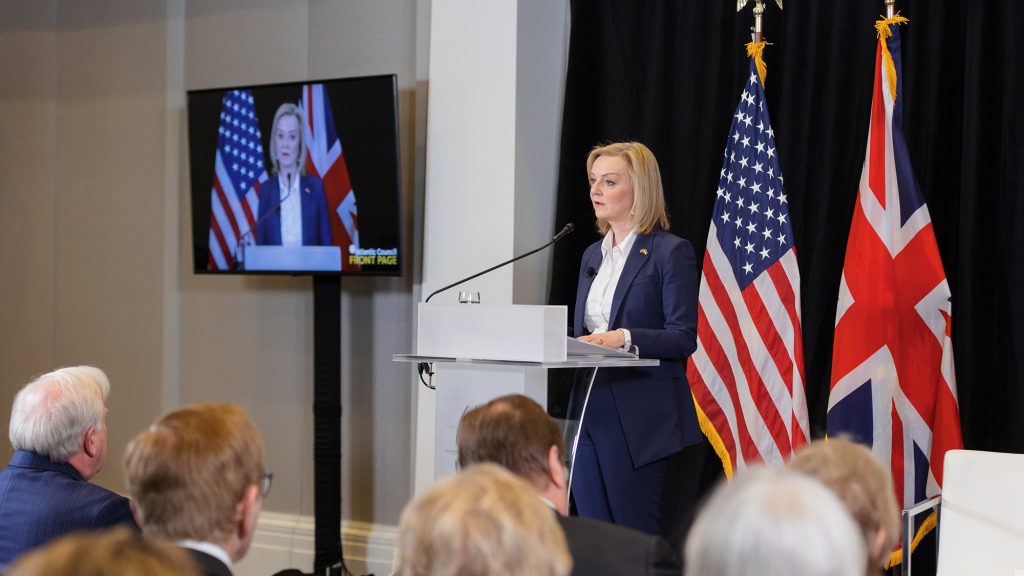
That’s why we must fix the problems of the Northern Ireland Protocol. All of the signatories of the Belfast Good Friday Agreement share a commitment to peace and stability in Northern Ireland. The UK is firmly opposed to a hard border. The Belfast Good Friday Agreement protects east-west ties as well as north-south ties. At present, however, the protocol is creating an imbalance between communities. The UK has put forward proposals to enable free trade to flow within the UK at the same time as protecting the EU single market.
Our objective is that the protocol can enjoy the support of all communities and ensure the democratic institutions of Northern Ireland can function. And we’ll need increased political will on all sides to make that happen, and pragmatism from the EU. I want us all to work together to resolve our differences and to be focused on the threats that we face, the immediate threats to European stability and security. Our ultimate aim, working with all our allies, is to make the world safe for freedom and democracy.
The transatlantic relationship is vital here. Britain and America have always been at the center of European and global security, at the center of a strong G7 with our friends in the EU, Canada, and Japan. We stand together to face down aggression around the world, from the South China Sea to Eastern Europe. President Biden and Prime Minister Johnson are seized of this task. That’s why in Cornwall last year they signed the New Atlantic Charter. They promised to renew the architecture of international cooperation for the twenty-first century, and they pledged to stand up for democracy, sovereignty, and territorial integrity. Putin should take note.
We will not rest until he fails in Ukraine and the country’s sovereignty is restored. Putin must lose because the consequences if he doesn’t are huge. So we will keep strengthening our response, replacing doubt with determination, and complacency with conviction. We must never let our guard down again. We will be tough, not because we want conflict but because we want to prevent it. Be tough, get peace. In this new era for global security, let that be our rallying call. Thank you.
We will not rest until [Putin] fails in Ukraine and the country’s sovereignty is restored. Putin must lose because the consequences if he doesn’t are huge.
UK FOREIGN SECRETARY LIZ TRUSS
The foreign secretary in conversation
FREDERICK KEMPE: As you see the horrors of Ukraine, what comes next? What do you think actually addresses this in a way that Putin looks at or the people around Putin look at and they say, well, this needs to stop?
LIZ TRUSS: The effects our sanctions are having are already extremely severe on the Russian economy. I mean, we’ve seen, for example, the sanctions we put on the central bank have prevented the spending of foreign reserve currency. That is extremely difficult. The everyday life in Russia has completely changed back to more what it was like during the Soviet era. People are no longer able to use Apple Pay or the credit cards that they were using. Western companies like McDonald’s are no longer there. So we have seen a dramatic impact of the sanctions, much more dramatic than Putin was expecting.
And I think one of the issues here, and why I talk about the age of complacency, is we didn’t respond strongly enough to what happened in Crimea and the Donbas, and he got a message that we weren’t serious when we said there would be severe sanctions. But there is still more we can do.
The fundamental driver of the Russian economy is oil and gas, and the absolute key has to be reducing dependency on oil and gas. And I recognize many European countries are very dependent. Some have as much as 80, 90, 100 percent dependence on Russia. We have to help them get off that dependence. We have to find alternatives. In the longer term, that’s about nuclear and renewables. In the short term, it’s about finding alternative sources.
Of course, the US can be helpful with respect to LNG, the industry that I started my career in. The Japanese have also offered to send cargoes. We need to do more with the Middle East. But we need to act more now because the sooner we get more sanctions on, the tougher it’s going to get for Putin, [and] the harder it is for him to fund his war machine. And the sanctions, together with supplying lethal aid to Ukraine, are absolutely key to enabling us to ensure that Putin loses in Ukraine.
Sanctions, together with supplying lethal aid to Ukraine, are absolutely key to enabling us to ensure that Putin loses in Ukraine.
UK FOREIGN SECRETARY LIZ TRUSS
And you’ve asked me how quickly. Well, the G7’s already working together on a package of new sanctions. We’re working closely with all of our allies. As I’ve said, we need to encourage not just us to go deeper, but we need to encourage broader adoption of those sanctions. There [are] 141 countries that voted against Russia at the UN. We’re encouraging all of those to adopt similar sanctions.
FREDERICK KEMPE: And it is remarkable, the notion of the G7 sanctioning and freezing the central bank assets of a G20 country. It’s unheard of. Is the logic that Putin himself says, this is unbearable, I’ll back off? Where do you think he goes? Is the logic that it’s his own internal circle says, this is enough, we’ve lost our yachts, we’re losing our chance to go to Western schools? How does that work? Or is it an uprising in Russia? What is the endgame for the sanctions? What do you think Putin’s endgame is? And how do they coincide?
LIZ TRUSS: Well, the primary objective of the sanctions is to debilitate the Russian economy to stop the funding of the weaponry that is being used to destroy Ukraine. That is the fundamental objective. That’s why financial services are so important. That’s why oil and gas [are] so important.
And we’re also sending a message to Russia itself and the Russian people. We know that Putin has control of the state media. We know that other sources of information are being cut off. Of course, the UK has set up a new information unit. We’re working with allies to communicate [with] the Russian people. But nevertheless, it’s hard to get messages through. However, people can see what’s happening when they have to queue at the bank or they can’t get onto the Moscow metro because they can’t use their payment mechanism. So it’s also a way of communicating with the broader population exactly what is happening.
So I think those factors are both extremely important. But it is the ability to degrade the Russian economy that is crucial to the sanctions.
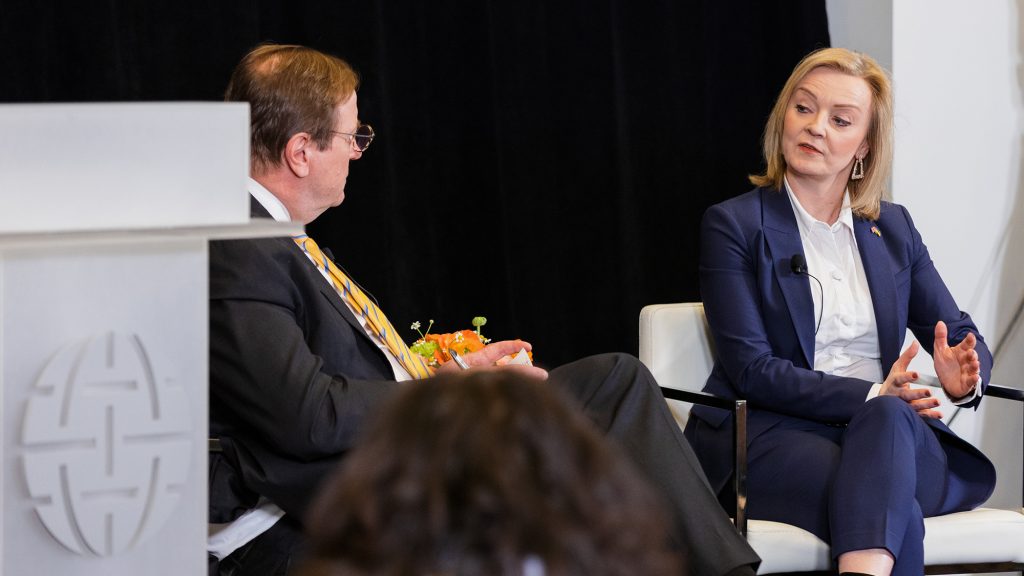
FREDERICK KEMPE: How important is it right now, as we see more atrocities coming out of Ukraine, to take further military action or military support… on behalf of allies, on behalf of the UK, on behalf of the US? And what specifically ought that be?
LIZ TRUSS: Well, we need to do as much as possible as early as possible to help Ukraine in its self-defense. The UK has been supplying anti-tank weapons for some time. We’re now supplying anti-aircraft weapons. We think that’s the most effective way of dealing with the Russian aerial threat.
We are helping Ukraine on the basis of their right to self-defense under the UN Charter, and within that framework, we need to do as much as we can as early as we can. The UK has hosted a donor conference with twenty-five other countries. We are helping logistics of getting that equipment into Ukraine.
But that is absolutely crucial. Alongside the economic sanctions, that’s the other main way we have of influencing this conflict and seeking to end this conflict as early as possible.
I am very fearful that we are looking at a very long-term conflict. But what we are seeing—and I think this has exceeded expectations, particularly of Putin—is we’re seeing very, very strong Ukrainian resistance. We’re seeing incredible bravery from President Zelenskyy and right the way through Ukrainian society, and we are seeing them resist the Russian invasion.
“We’re seeing very, very strong Ukrainian resistance… We need to do all we can to help that.
UK FOREIGN SECRETARY LIZ TRUSS
We need to do all we can to help that. In any crisis, countries always wish they’d done more earlier. That’s always the lesson of crises and the lesson of the build-up over the last twenty years.
And Putin made it very clear what his intentions were at the Munich Security Conference in 2007 but not enough attention was paid at that time. We were too complacent. We absolutely can’t be complacent now, and as the United Kingdom, we are doing all we can. We encourage all of our allies to do all they can.
You know, some countries have different equipment, can operate in a different way. Some countries are more dependent on Russian oil and gas than everybody, but it is a collective effort. I think we have shown huge unity across the G7 and beyond, and we need to continue to do that.
FREDERICK KEMPE: And during your address, you made clear that the sanctions weren’t yet sufficient and more needed to be done. Do you feel the same way on the military side?
LIZ TRUSS: Well, we are stepping up our efforts, and yes, more needs to be done. There is continual demand and, of course, those weapons are being used. So we continue to supply more and the Ukrainians continue to need more.
FREDERICK KEMPE: Russian information operations—this is an area where your country has been a leader—they’ve been constant and they’ve included—and as you said, we haven’t responded early enough—efforts to undermine elections, deny the assassination attempt of Sergei Skripal on British soil, [and] so much else.
Now Russia has used this tactic to falsely justify the invasion of Ukraine. This time, we got ahead of a lot of the information. We’ve done a lot better. What is the challenge now? Having been such a leader globally on countering Russian disinformation, how does it change now that we’re involved in a hot war?
LIZ TRUSS: There was a lot of effort to preempt the Russian invasion and to call out the playbook in advance of the invasion. We released intelligence showing that there was an intention to create a puppet regime in Kyiv. We’ve released information about Russian cyberattacks.
We’ve used intelligence to expose what Putin was planning, the fact that he is planning a false flag operation to try and justify the invasion, and I think that exposing [Putin’s] plans and his techniques have helped us convince countries that Putin has been lying. I mean, right until the invasion, he and his colleagues were making public statements saying they had no intention to invade Ukraine.
There are still public statements coming from Russia that they are not fighting a war, and this just beggars belief. I haven’t spoken to a single counterpart who, in all conscience, can say the Russians are telling the truth.
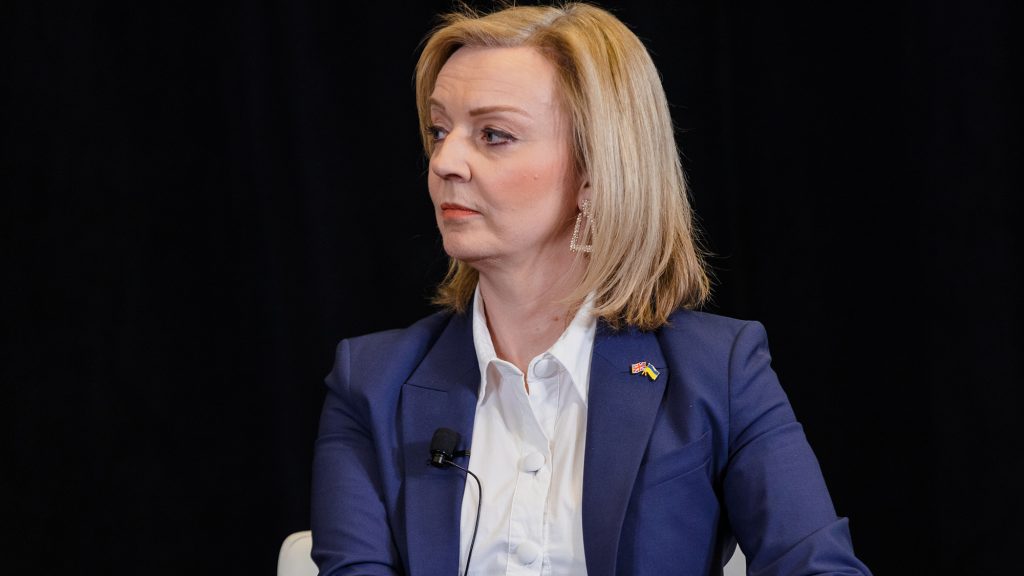
And one thing, I think, that happened at the end of the Cold War, the UK, certainly, disbanded its information unit. We assumed that it was over, that we were moving into a new era of peace and prosperity. Those information units were not disbanded in Moscow, and I think for a number of years we were outpaced in disinformation.
We’ve now created a new information unit across our government. We are working to communicate in various ways with the Russian population and with the wider world. And we’re working with our allies across the G7 to do that. And I think that’s incredibly important because, as well as being a traditional battle, if you like, on the battlefield, this is also about information and perception. And we are being proactive.
And you’ve asked about the next phase, what we’re doing now. Well, we’re calling out, you know, these false claims about humanitarian corridors that only lead to Russia, or that have mines along the route and aren’t genuine humanitarian corridors. We’re calling out their action of bombing the maternity hospital. We’re calling out what the Putin regime is doing and how they’re using a similar playbook to the playbook they used in Syria. So we are constantly working with our allies to be absolutely clear about what the truth is. And, you know, I pay tribute to the brave journalists in Ukraine who are helping us expose the absolutely appalling actions of the Russian government.
FREDERICK KEMPE: And you spoke to the ICC. Would you go so far as to say there are war crimes?…
LIZ TRUSS: Well, we are very clear that there is strong evidence that we are seeing war crimes taking place. And we need to take that evidence and recall that evidence. We’re working with our allies to do that. Thirty-eight countries referred the case to the ICC. We are working to collate the evidence on the ground of what is happening, to make sure that Putin and his associates are held to account for these appalling actions.
FREDERICK KEMPE: You called out China. Watching China right now, the 5,300-word statement on the eve of the Olympics between Putin and Xi said it was a relationship without limits. Obviously, President Xi must be looking at that differently, but on the other hand, what signs do you see? You said China should do more. What specifically would you call upon China to do? And so far, as you’re watching China, do you see them moving off of their support for Russia in any important manner?
LIZ TRUSS: Well, it was significant that China didn’t vote with Russia at the UN Security Council. And judging from the statement we saw prior to the Olympic Games, I would question whether the whole truth was told to China about what was planned. And as opposed to Russia, who have said that Ukraine doesn’t exist, China has confirmed Ukraine’s sovereignty. And what we are saying to China is, as a country [that claims] that they believe in Ukraine’s sovereignty, they need to stand with the international community in opposition to what Russia is doing. I mean, I talked in my speech about the company that Russia is in, including North Korea and Syria. Does China want to be in that company?
As a country [that claims] that they believe in Ukraine’s sovereignty, [China needs] to stand with the international community in opposition to what Russia is doing.
UK FOREIGN SECRETARY LIZ TRUSS
FREDERICK KEMPE: And are you seeing evidence that China is helping to support Russia counteract sanctions, for example? And what message would you have for China on that? Because that could be a crucial part of what we’re trying to accomplish.
LIZ TRUSS: Well, my message to China is they should not be aiding and abetting this appalling invasion of a sovereign nation. Do they want the international reputation for doing that?
FREDERICK KEMPE: Putin has spoken. He’s done some nuclear saber-rattling. He’s talked about chemical weapons. He’s talked about how sanctions are an act of war. Are you concerned? Do you think there’s bluff to this? Are you concerned that he might broaden beyond the borders of Ukraine, not kinetically, but with cyberattacks, with other sorts of attacks? And how prepared should we be for that potential?
LIZ TRUSS: What is absolutely clear is that Putin’s invasion is not going according to plan. He thought it would be much more straightforward, he didn’t think the Ukrainians would mount the defense of their nation that they had. And as a result of his plan not working, he is resorting to rhetoric, to escalatory measures, [and] to, I fear, using more and more barbaric techniques, and we will call him out for that. But we must be absolutely resolute in not taking our foot off the pedal at this stage but, instead, remaining strong, because as I said in my speech, that is what he understands. We must be stronger. We’ve been strong in our sanctions, but we must be stronger, and we must be strong in supplying Ukraine with the weapons they need to defend their country.
We’ve been strong in our sanctions, but we must be stronger, and we must be strong in supplying Ukraine with the weapons they need to defend their country.
UK FOREIGN SECRETARY LIZ TRUSS
FREDERICK KEMPE: And nuclear threat—you take seriously, don’t take seriously?
LIZ TRUSS: Well, as I’ve said, he is using this rhetoric as a distraction from the fact that his invasion is not going according to plan and he has tried to move us off the focus on the appalling invasion that he’s undertaken. I don’t think we should debate on his terms.
FREDERICK KEMPE: You talked about this as a paradigm shift. We, the Atlantic Council, have used the language of inflection point, paradigm shift, [or] historic moment, perhaps as important as the end of World War I, World War II. That then calls upon us to not just look at Ukraine as Ukraine but something—and because you’re talking about the end of complacency, it also suggests we’ve been complacent. What do we need to do beyond this, as NATO; as the UK, EU, US; [and] as global allies? Do you have any specific ideas—that we’re going to be working on this in the weeks and months ahead, because as terrible as this crisis is, it’s not the end of what we’re facing—and that’s what you so powerfully underscored in your speech. Do you have some ideas of how we should use this moment to build on this message of [a] paradigm shift to use it as a paradigm shift for how we also cooperate with each other, work with each other?
LIZ TRUSS: Well, I completely agree and we need to rethink some of our assumptions about the way we’ve been operating because I talked about defense spending, I talked about deterrence, I talked about the global security architecture [and] about arms control; these are all key areas [in which] we need to be thinking about what we do differently. And then the other area I’d point out is economic dependence. You know, we’ve been through an era of globalization [in which] we treated all the counterparties we’re dealing with as equal, but it’s very different being part of a trade relationship or an investment relationship with a like-minded ally that believes in sovereignty, territorial integrity, freedom, and democracy from being dependent on an authoritarian regime. So I think in terms of our economic relationships, we need to be much clearer about the values the countries we’re dealing with have, and that era of values-free trade, of underspending on defense I think [is] very, very clearly over and we are in a new era. If you look at what Germany has done in completely rethinking its energy policy, its security policy within the space of about a week… That is the rethinking we all need to be doing now.
We need to be much clearer about the values the countries we’re dealing with have.
UK FOREIGN SECRETARY LIZ TRUSS
FREDERICK KEMPE: And is this also a petri dish for the new UK-EU relationship? How have you been navigating this situation at this time with sanctions playing such a crucial role?
LIZ TRUSS: We’re working very closely with our EU allies, with our NATO allies, and also, more broadly, with countries like Japan, South Korea, Australia, and others. And this is really about a network, a coalition of countries that believe in territorial integrity and sovereignty, and in playing by the rules. I think that’s fundamentally important as well. And last week I attended the EU Foreign Affairs Council with [US] Secretary of State Antony Blinken; with Mélanie Joly, the foreign minister of Canada; and we are all working extremely closely together because this has been a huge shock for Europe. We face a threat. We never thought we would see this type of war taking place in a European country. We thought those days were over, that we moved on, and I’m afraid we haven’t moved on. And this doesn’t just apply to the politicians in the country; this is what our public feel like, too. We feel a different level of concern about security than anything we’ve felt like for the past—well, for my lifetime.
Watch the full event
Further reading
Thu, Feb 24, 2022
#BritainDebrief – What can Britain do to help Ukraine? An Emergency Debrief from Tom Tugendhat, MP
Britain Debrief By Ben Judah
As Russia launches a full-scale invasion of Ukraine, Senior Fellow Ben Judah spoke with Tom Tugendhat, MP, Chair of the UK Foreign Affairs Committee, on what Britain and its allies can do for a special emergency #BritainDebrief.
Fri, Jan 28, 2022
Experts react: The view from European capitals as consensus emerges against Russia
Experts react By
Which EU member states will rise to the challenge from Russia? The Atlantic Council's Europe Center experts weigh in with views from across the continent.
Mon, Feb 28, 2022
What’s driving Putin’s invasion of Ukraine? A former NATO chief who met him explains.
New Atlanticist By
Lord George Robertson explores what changed the mind of Vladimir Putin, who once asked when Russia would be invited into NATO.
Image: UK Foreign Secretary Liz Truss speaks with the Atlantic Council at the 2022 Christopher J. Makins Lecture on March 10, 2022. Photo via Elman Studio.
